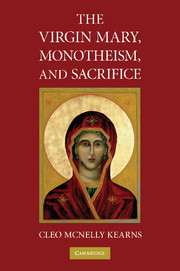Book contents
- Frontmatter
- Contents
- Preface
- Acknowledgments
- Introduction: A Vehement Flame
- PART ONE THEORIES OF SACRIFICE
- 1 Sacrifice, Gender, and Patriarchy
- 2 Abrahamic Sacrifice
- 3 Marian Sacrifice
- PART TWO MARY, MOTHERHOOD, AND SACRIFICE IN THE GOSPELS
- PART THREE MARY AND PRIESTHOOD
- Conclusion: Beyond Orthodoxy
- Notes
- Index
1 - Sacrifice, Gender, and Patriarchy
Published online by Cambridge University Press: 27 July 2009
- Frontmatter
- Contents
- Preface
- Acknowledgments
- Introduction: A Vehement Flame
- PART ONE THEORIES OF SACRIFICE
- 1 Sacrifice, Gender, and Patriarchy
- 2 Abrahamic Sacrifice
- 3 Marian Sacrifice
- PART TWO MARY, MOTHERHOOD, AND SACRIFICE IN THE GOSPELS
- PART THREE MARY AND PRIESTHOOD
- Conclusion: Beyond Orthodoxy
- Notes
- Index
Summary
It is a rather firmly patriarchal (and relatively transcendental) notion of deity that sets the grisly logic of sacrifice in motion in the first place.
Ivan StrenskiSacrifice is childbirth done better.
Nancy JayAll that his mother gave him burned away.
Only the image of his father's likeness
Rose from the ashes of his funeral pyre …
So Hercules stepped free of mortal being …
And with an air of gravity and power
Grew tall, magnificent as any god.
Ovid, MetamorphosesMuch of mary's role in and among the monotheisms is determined by theological understandings and devotional practices centering on her relationship to patriarchal sacrifice: first, her relationship to what Christians took to be the sacrificial traditions of the people of Israel; then, her relationship to her son's sacrifice on the cross; and finally, her relationship to its anamnesis or remembrance in the Eucharist or “sacrifice of the mass.” The precise relationship between Mary and sacrifice in these contexts is neither fixed nor unvarying, and the association has a variety of theological, liturgical, social, and devotional manifestations. Underlying them all, however, are important general functions of the discourse of sacrifice, a discourse widespread in human cultures, and one with a particular bearing on constructions of gender, motherhood, and fatherhood in religious and social life.
DEFINITIONS AND DISTINCTIONS
Even when limited to the context of religion, sacrifice is not an easy phenomenon to define.
- Type
- Chapter
- Information
- The Virgin Mary, Monotheism and Sacrifice , pp. 23 - 59Publisher: Cambridge University PressPrint publication year: 2008



